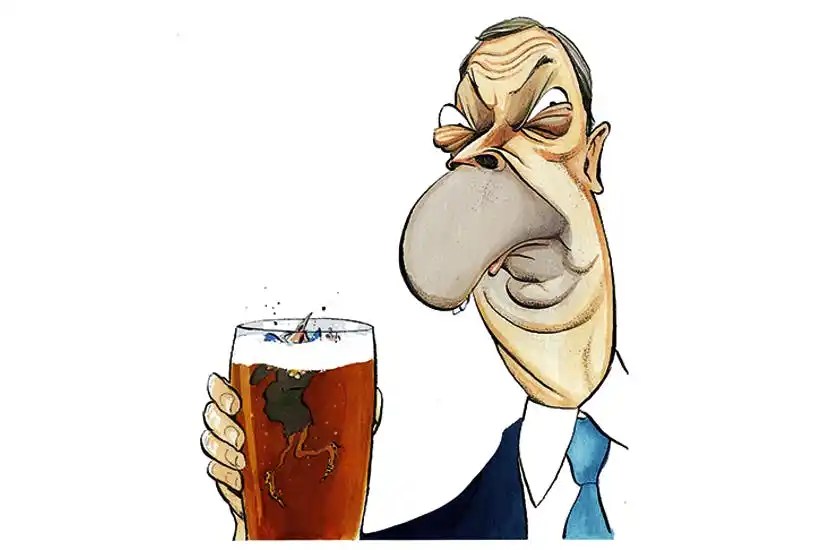The rise of Ukip and the highway to Brexit was greatly smoothed by the widespread perception that British governments had lost control of immigration. For many years, we purists in matters of nation-state independence struggled to articulate a stand-alone ‘sovereigntist’ argument that would catch fire with the wider public. But then Tony Blair threw open the UK labour market to millions of workers from the A8 EU accession countries, without even taking advantage of the transitional controls offered to existing member states by Brussels. As enormous numbers of Poles, Slovakians and others came to Britain to compete for working class jobs, suddenly we were in business.
It is often forgotten how long it took Nigel Farage to break-out of the fringe right-wing zone in which the British media kept him corralled. But it was well into the 2010s before right-of-centre newspapers became willing to quote him extensively. Without all the main parliamentary parties being seen to fail on immigration control – first Labour and then the Conservative-Lib Dem coalition – I doubt it would have happened.
As we know, genies cannot easily be put back into bottles and so it has proven with Farage. And yet he has not been a fixture in frontline politics, instead diversifying into broadcasting first with LBC and lately with GB News. His direct political activity has waxed and waned for 15 years or more.
In 2009, he led Ukip to second place at the European elections but stood down as leader before the 2010 general election having correctly discerned that it would be a tough gig. A return followed, which encompassed outright victory at the 2014 European elections and a spectacular 13 per cent vote share at the 2015 general election. But within weeks of the Brexit referendum success of 2016, he quit the party leadership again. And so it was that Paul Nuttall found himself in the hot seat for a 2017 election at which Ukip’s clothes had been stolen by the bigger parties rendering its prospects very poor.
The preening brigade of liberal Conservatives could hardly have set things up better for him
Once Theresa May had been exposed as a betrayer of Brexit, Farage brilliantly put together the insurgent Brexit party to finish off her premiership by squeezing the Tories down to a 9 per cent vote share at the 2019 European elections. After a bruising experience at the general election a few months later, he handed on the party – now rebranded as ‘Reform UK’ – to Richard Tice. It is fair to say that, until a few weeks ago, it had struggled to make much impact.
What should be discerned from this gallop through the Farage years is not that he is an arch-opportunist so much as a canny campaigner who understands when conditions are conducive and when they are not. When he embarked for Australia and the I’m A Celebrity jungle, there were already signs that political space was opening up for him again. Tory-leaning voters were becoming increasingly scratchy about their party’s record on everything from taxation to public services, net zero to that old staple of immigration.
Since he has been away, new evidence of political climate change has come in at an accelerating pace. Suella Braverman got sacked for telling the truth about multiculturalism, ‘hate marches’ and Rishi Sunak’s failings. The Prime Minister made the Remainer-in-chief David Cameron Foreign Secretary – in charge of UK relations with the EU once more. The Supreme Court torpedoed the Rwanda policy and Braverman exposed Sunak’s hesitancy in pursuing it. This week, Sunak’s enormous breach of faith with the Conservative voting tribe on legal immigration has been exposed as well. Even in the absence of Farage, Reform UK has surged at Tory expense and is now averaging nine per cent in polls. Important Tory commentators have pulled the plug on Sunak, with the Daily Telegraph’s Allison Pearson telling readers: ‘The Conservative party is dead to me.’
Across Europe, right-wing populists are making big electoral gains amid growing angst about Islamist militancy. Geert Wilders in the Netherlands is just the latest example.
With a British general election coming up next year, this is surely the sweet spot to end all sweet spots for a new right-wing insurgency. If the jungle sojourn goes well for Farage – and, so far, it seems to be – then he will return even more famous and potentially on the brink of national treasure status. Under his leadership it is not hard to envisage the Reform poll rating doubling and the Tory one falling from the low 20s down into the teens.
The prospect of dishing out a second punishment beating to a Cameroon Conservative party and being seen once more as a political gamechanger is going to be very tempting indeed for Nigel Farage. The preening brigade of liberal Conservatives could hardly have set things up better for him.
The notion of Farage one day joining the Tories has recently been widely floated by MPs on the party’s right, by Rishi Sunak and even by himself. Some on the party’s liberal flank shudder at the prospect. Were they properly alert something much more threatening would be causing them to gulp: their old tormentor may soon be coming home with a view to a kill.







Comments